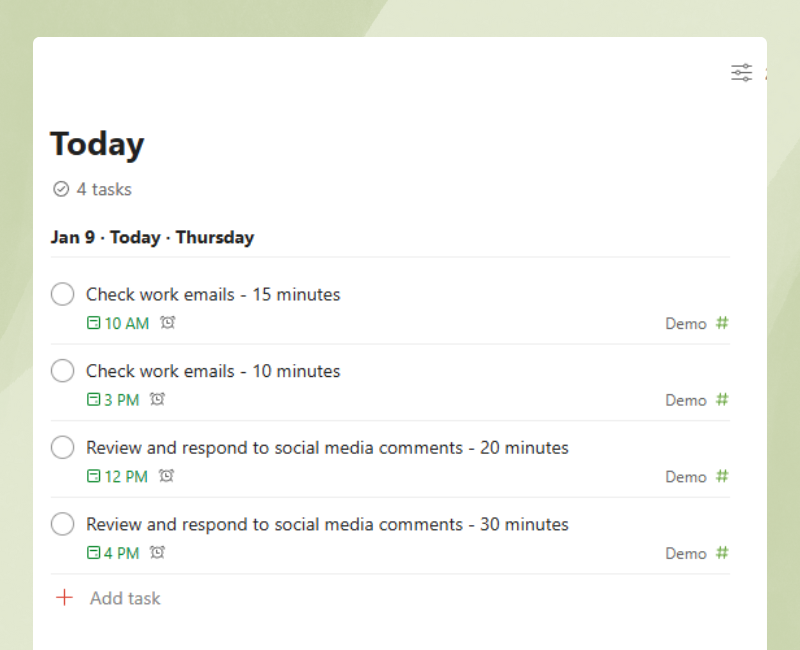Why Your Morning Habits Are Hurting Your Productivity (And How to Fix Them)

A few years ago, remote work turned my life upside down.
Armed with a to-do list, I was determined to master the art of working from home. Despite my best efforts, I always ended up missing several tasks. I was overwhelmed by endless tasks, yet I never seemed to catch up with the most important ones. There never seemed to be enough time, and the stress over what I didn’t finish made things even worse.
As I stretched my work hours in a desperate attempt to catch up, my productivity only got worse, taking a toll on both my physical and mental health. I felt trapped in a cycle of constant work, losing any time for things that made me happy.
Since I was new to the workforce, I thought I was the only one struggling. Working alone at home made this feeling even stronger.
After just four months into my new work lifestyle, I faced my first major challenge—burnout.
This pushed me to look into what I was doing wrong, and I found a fundamental flaw: how I started my day.
While I knew what I wanted to achieve, I was bad at setting up a system to make it happen.
James Clear, the author of Atomic Habits, argues that excessive focus on goals without a system can lead to failure, which was one of my major problems:
“Goals are good for setting a direction, but systems are best for making progress.”
It turns out, the first few moments of your day can set the tone for your entire workday. Wayne Elsey, the Founder and CEO of The Funds2Orgs Group, notes that a productive start boosts your chances of professional and economic success:
“Many people don’t realize it, but what happens in those first few moments of your day impacts your productivity even before you’re at work. Further, the chances are that if you increase productivity, the higher likelihood of professional and economic success.”
By changing how I start my day, I’ve found 5 simple ways to improve my morning routine, making my entire day more productive and peaceful.
1. Start your day with a personal win
I used to dive straight into work as soon as I woke up, neglecting the idea of putting myself first. It wasn’t something I was familiar with, especially when working remotely. I always thought I’d get around to my personal projects at the end of the day.
Yet, every evening, I found myself mentally drained, unable to muster the energy for activities that excited me. This routine often left me feeling frustrated, as if my day was consumed only by work obligations without space for personal passions.
The truth is, starting your day with an activity just for you can significantly influence both your productivity and overall quality of life. Many successful individuals have morning rituals that prioritize personal fulfilment before work.
For example, Melanie Perkins, the CEO of Canva, emphasizes the significance of starting her day with a personalized routine that sets a proactive tone for the rest of her activities. She describes her morning ritual:
“I love reading tweets from our Canva community and have just started using the Five Minute Journal, where you write the answers to a few questions such as ‘I am grateful for…’ and ‘What would make today great?’ It’s a lovely way to start the day and helps to ensure I’m proactively shaping my day ahead. I’ve only been doing it for a couple of weeks — but hope to keep it up!”
For me, dedicating the first two hours of my morning to exercise and work on my current pet project sets a positive tone for the rest of the day.
Discover what energizes you and make it a staple of your morning routine. So, what’s it going to be?
2. Learn how to really disconnect from work
I used to struggle a lot with unplugging after work. Because I manage social media for a living, my phone was constantly flooded with work emails and notifications—even at night. I’d wake up to over 50 notifications, which meant before I even got out of bed, my mornings always started with me mentally clocking into work, sifting through notifications instead of focusing on my personal time.
Studies show that about 71% of people check their phone right when they wake up. If you’re in that group, you probably know how it feels to see a stream of Slack or Twist messages before you’ve even had your coffee. It’s tough on your morale and can wreck your productivity for the rest of the day.
How to fix this:
I decided to turn off all my work notifications the moment I wrap up my day. I also set aside two short blocks of time—about 10 to 20 minutes—to check emails and respond to messages.
For social media comments, I schedule small time slots throughout the day instead of jumping in every time my phone buzzes.
This way, I start my mornings feeling calm and in control. I have more time for myself, and when I do check my notifications, I’m focused and ready to respond.

It’s a simple change, but it makes a huge difference in keeping my work and personal life balanced.
By creating boundaries, you give yourself space to enjoy uninterrupted personal time, leading to a more focused and effective workday. Try this approach and see how much more peaceful your mornings can be, and how much more you can accomplish when you control when and how you engage with work.
3. Plan better
It might seem obvious if you’re struggling with your to-do list, but it’s possible you’ve been setting yourself up for failure from the start. For example, you might be adding more tasks than you can realistically handle (I’ve definitely been guilty of that), not breaking bigger tasks into manageable steps, or underestimating how long each task takes.
Do a time audit
One way to solve these issues is by doing a quick time audit. Track how long it actually takes to complete a few of your routine tasks. Once you know this, you can plan your day more accurately and avoid overbooking yourself.
Customize your to-do list
Next, focus on creating a to-do list that’s designed perfectly for you. Everyone’s schedule, energy levels, and work style are different—so a one-size-fits-all list won’t cut it.
Note
Tip: If you need ideas on how to do this, here are 7 Todoist setups from productivity experts you can steal.
End-of-day ritual
Finally, a consistent end-of-day ritual sets you up for success. Take a few minutes before clocking out to review the day’s wins and plan tomorrow’s tasks. It helps you start the next day with clarity and peace.
Note
Here’s a handy shutdown ritual template that could help.
By planning more realistically and ending each day on the right note, you’ll make your mornings smoother and enjoy a greater sense of accomplishment.
4. Face tasks you’ve been putting off
This is all about breaking the cycle of guilt. Before I developed my own morning routine, I often started the day feeling guilty about the tasks I didn’t finish the day before. That guilt weighed me down, made me less productive, and kept me from focusing on new tasks. Eventually, I’d fall behind on fresh tasks too, and that cycle would repeat. Sound familiar?
You want to start your day with peace of mind and a positive mood. One way to do this is to set aside time to deal with any tasks you’ve been avoiding. Here’s what I do:
- Reflect: Take five minutes to think about why you’re putting the task off. Is it too big or complex?
- Break it down: If the task feels overwhelming, split it into smaller subtasks. Assign a time for each subtask so they’re easier to tackle.
- Schedule it: Block out a specific time in your weekly schedule to handle these postponed tasks.
By doing this, you won’t feel guilty about unfinished tasks because you know exactly when they’ll get done. It also motivates you to tackle them head-on. There’s a real sense of accomplishment when you can finally cross them off your list.
There are many ways to break out of the procrastination loop. You just have to find the one that works for you.
5. Give Yourself Time to Adjust
Building a new habit is a process, and it’s normal to stumble along the way (I’ve done my fair share of this). Instead of getting frustrated, understand that consistency takes time.
According to a study on habit formation by the European Journal of Social Psychology, it can take anywhere from 18 to 254 days to form a new habit. The key is to keep going, even if you slip up.
Rather than viewing those slip-ups as failures, treat them as learning opportunities. Ask yourself what went wrong and how to make it easier next time.
For example, if you keep missing your morning journaling routine, consider prepping your notebook and pen the night before or setting a reminder on your phone.
When you follow these steps consistently, you’ll gradually build a routine that feels natural and rewarding. Over time, you’ll notice:
- Less Stress: Because you have a clear plan and realistic expectations.
- Improved Focus: You’re no longer bogged down by guilt or uncertainty.
- Greater Productivity: Each day starts (and ends) on a positive note.
Give yourself the patience and compassion you deserve. By adjusting bit by bit, you’ll soon find a rhythm that helps you breeze through your tasks and truly enjoy your workday.
As James Clear, author of Atomic Habits, says,
“You do not rise to the level of your goals. You fall to the level of your systems.”
Embrace the process of creating effective systems, and the results will follow.
Heritage Elizabeth Akangbe
Heritage is passionate about all things marketing. When she isn’t working, you’ll find her on her farm with a book in hand, accompanied by her two dogs.

